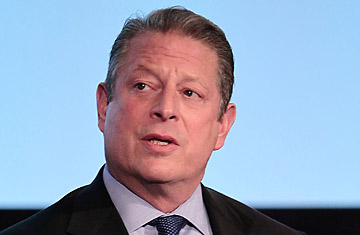
Al Gore, February 2011
No, Al Gore did not invent the Internet, but the former Vice President and Nobel Peace Prize winner has always has a hand in high-tech, even as he warned the world about global warming. Those two interests are intersecting with the release of a new iPad, iPhone and iPod Touch app version of his recent climate and energy book Our Choice. The app is one of the first truly multimedia e-books, with interactive graphics, video, photos with geolocation and narration by Gore himself. Gore sat down with TIME's Bryan Walsh in the New York offices of Gore's firm Generation Investment to talk about the Our Choice app, the state of the climate movement and post-truth politics.
Q: Does the app get you a new audience for the book?
A: Yes it does. We live in a multi-platform world. I think that the app experience is a magical one that will give it a lot of velocity as a media form because it combines books, movies, audio, animation and interactive features. There is nothing between you and the content, and there is no computer hurdle to clear. You just touch it with your finger, blow on it and manipulate it. It's very intuitive.
Q: Will this change the writing and the reading experience? Is this the future of books?
A: This is an evolutionary process that will find it's own pace. My personal view is that it is going to happen fairly quickly. The advantages of an app are immediately obvious to many people who interact with it. But just as movies need a script and scripts need scriptwriters, apps that are rich in content will still be derived in one way or another from books. At some point, though, it will reach an inflection point where people begin to think about in the first instance of how the app is going to take form.
Q: Would your next book go straight to the app format?
A: If I were the age of these guys [indicating the app designers in the room], I would. But since I'm not I will probably repeat just writing first. If my learning process moves quickly, maybe instead of waiting until he last stages of the book to think about the app I will think about it at the beginning.
Q: How has your media consumption changed in recent years with the advent of the iPad, Twitter and other technologies?
A: I think it's a richer experience. I tweeted the introduction of this app approximately two and a half seconds after I got the go ahead. I remember when I was a kid, television was just going in. My family didn't get its first TV until I was 10 years old. I remember a stretch of quite a few years when people would say they had read a story in the New York Times, and then they would say, "I saw Walter Cronkite report the same story" but my experience of it was completely different. As we become bimedial, I think that it's a richer experience. And I don't think anything has to be lost.
Q: Where is the climate movement right now? Is it still about pushing the message out to the public, trying to build the political will for action?
A: That's still the model of change that I am operating on. And I'm doubling down on all of my efforts to get the facts communicated as clearly as I am capable of communicating them, and importantly, to communicate the solutions. The great thing about this tool is that it draws people in and it makes the story easier to absorb. Years ago I shifted from making speeches about climate to presenting slideshows precisely because the complexity of the material makes it easier to communicate with pictures. Interactive infographics make it easier still.
Q: Has the case been conclusively made now on the science of climate change?
A: Well, I thought the case was made that Obama was born in the United States...
